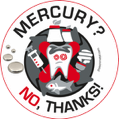Start English 1 - Preface 2 - Introduction 3 - Diagnosising 4 - Patient reports
5 - Amalgam 6 - Symptoms 7 - Who gets ill? 8 - Mercury-free dental care 9 - Detoxing
10 - Avoid poisoning 11 - Research 12 - Researchers/Practitioners 13 - Protest agains EU
14 - Bivirkingsgruppen Norway 15 - Norway leads the way 16 - Germany sued
17 - References / Sources 18 - My personal Network 19 - Video Documentations
NNM-WEBSHOP Buy pin/badge NNM-NEWS NNM-NEWS 2
EVIDENCE OF HARM video Tooth-only .


3. WHERE AND HOW IS THE DIAGNOSIS MADE? / TESTS!
As opposed to acute heavy metal poisoning, it is not enough for your doctor to take a blood sample and have this tested for heavy metals. The fact is that heavy metals (especially mercury) hide in bones, organs and the brain, and you therefore for instance need to ingest/have an injection of special medicines (e.g. DMPS, also called Dimaval) to release the heavy metals and thereby allow them to be measured in your urine.
In Denmark, as far as I know at the moment, there are not that many
serious experts in the field to whom you can turn (see also point 12):
http://www.holistic-medicine.dk
In the U.S. there is the Quicksilver Scientifc laboratory that spezialises
exclusively in analysing all 3 types of mercury in the human body:
http://www.quicksilverscientific.com/clinical/clinical-testing.html
A hair mineral analysis can also be performed by specialists in the field. The analysis shows accumulations of mercury and other metals in the hair; they originate from blood mercury, etc. This can be misleading because of the ability of heavy metals to hide themselves in the body (see details above) and therefore give a falsely negative result:
Last, but not least, you yourself can perform a screening test on your urine at home to get an indication as to whether or not it is a question of heavy metal poisoning or to what extent and which metals. There are also pros and cons here for the reliability of
the results, but I didn’t doubt and the test got me on the track:
http://www.nissenmedica.com/pages/products/heavy_metal
Some people also rely on a so-called porphyrine test aimed to investigate whether the urine contains porphyrins - which in turn indicates the level of ones heavy metal toxicity. It is important to point out that this test does not measure mercury directly and can not say anything about the accumulation of heavy metals in the central nervous system (brain):
http://www.labtestsonline.org/understanding/analytes/porphyrines/test.html
http://www.mercurypoisoned.com/new/urine_porphyrin_test.html
Another possibility is the so called faecal metal test:
http://www.doctorsdata.com/test_info.asp?id=9
Dr. Tom McGuire has gathered and explained different test procedures on his website:
http://dentalwellness4u.com/mercurydetox/testformercury.html
Furthermore he has developed the Mercury Risk Evaluation test where you print a chart and answer the questions in order to establish you personal risk profile:
http://www.dentalwellness4u.com/layperson/mercuryriskevaluation.html
http://www.dentalwellness4u.com/layperson/mercury-risk-chart.pdf
It is also possible to test whether one might be allergic to respectively negatively affected by the tooth filling material used in one's mouth (whatever material), ie. whether there is a so-called immunologically sensitization. This is done using an LTT-test "Lymphozytentransformationstest" or a MELISA test.
The test is conducted on the basis of a blood sample to be submitted
same day to the laboratory and not to be cooled down.
Further details available here:
http://www.imd-berlin.de/index.php?id=540 (German)
http://www.melisa.org/melisa-ltt.php
PLEASE NOTE COMPOSITE FILLINGS:
You can also be allergic to, respectively have side effects of composite fillings, respectively. the bond (glue) that is used. There are clearly different grades/qualities of composites and glues on the market, so here too it is important to gather information in advance and if you suspect that the composite fillings or glues already in your teeth/mouth are making you ill to have a LTT test carried out.
http://www.tannlegetidende.no/pls/dntt/pa_dtdm.xpnd?vp_seks_id=171846&b_start=1&vp_sok=nina (Norwegian)




